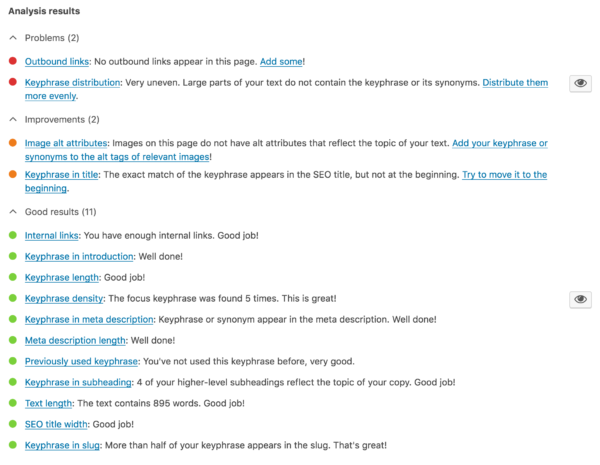Ever since I started using Yoast SEO plugin, I’ve been amazed by its ease of use and by the many features it contains. Our analysis offers everything you need to fine-tune your text in such a way that search engines will be more likely to rank your content. I genuinely believe that the SEO analysis features in Yoast SEO can help you make your text SEO proof in a very, very easy way. The checks the plugin does are amazing, and we’re constantly working to improve the existing checks and add new ones!
But, you should be aware of the temptation of the green bullet! In this post, I’ll discuss three pitfalls to watch out for, and how to deal with them when optimizing with Yoast SEO.
Pursuing all the green bullets in Yoast SEO
The gamification in our Yoast SEO content analysis helps you to upgrade the SEO-friendliness of your post. Using it is great fun! It can feel like an exciting challenge to always get as many green bullets as possible. However, this gamification can make you lose sight of what’s truly important when optimizing your articles. It could also increase the likelihood that you’ll cheat your own SEO process to get every bullet green in Yoast SEO. Of course, neither would be good for your SEO! Let’s discuss the three main pitfalls of the temptation of the green bullet.

1. Not every post or page has to be optimized
When you’re adding content in the backend, it’s just so tempting to fill in a focus keyword and start getting those green bullets. But before you start optimizing, you have to ask yourself: does this post or page need to rank? Does that fit in my keyword strategy? Won’t it be competing with another page that’s more important?
Not every page on your site has to be optimized, so you should always think about how your content fits in the grand scheme of things. For example, in some cases, you should aim to rank with a category page. Optimizing another page with more text for the same (or a similar) keyword could even harm this category page’s chances to rank. Some content, like announcements, doesn’t really need to be optimized. Always consider whether it’s actually necessary to add a focus keyword and get that green bullet. Of course, if your keyword strategy and site structure are in order, you’ll already have thought about all this and you’ll be good to go!
2. Not every bullet has to be green
Now, let’s say you established that you really want the content you’ve just written to rank. Does that mean that every single bullet in the Yoast Readability and SEO analysis has to be green? No, not every bullet has to be green to rank. Beware, you shouldn’t just ignore the feedback whenever you want, but always use common sense when optimizing.
So, let’s take a look at the process. You’ll probably know that once you’re done writing your content, you should first look at the suggestions in the readability analysis. Then, you turn to the SEO analysis and optimize your post (or yoast your post, as we like to call it). If, during either step, you have an orange or red bullet or two, that’s fine. It doesn’t mean your post will never rank. Look at the feedback in each check and use your own common sense to decide whether the suggestions will actually improve your text and your SEO. Some red bullets could be more urgent to fix for you than others. Just try to make sure that both analyses have green overall bullets.

An example is the consecutive sentences check. It can give you a red bullet for using a list in your copy, as these often start with identical words. Writers sometimes also deliberately start several consecutive sentences with the same word, for instance, to place more emphasis on them. Another example is the passive voice check, which unfortunately sometimes gives false positives. And, if you’re unable to add a relevant outbound link, you’ll get a red bullet. But you shouldn’t add a link just for the sake of it. In such cases, you can safely ignore your orange and red bullets (though it may be hard ;-))
3. Don’t cheat your keyword research: keyphrases and synonyms
A final thing to watch out for: don’t change your keyphrase at the last minute to get a green bullet. It can always happen that you aim to rank for one particular keyword, but end up using a synonym of that keyword in your text. Perhaps because you subconsciously prefer that word, it’s an easier word to use or more prominent in your vocabulary. But whatever the reason, if you’re consistently using another word instead of your keyphrase, you’ll soon find your bullets orange and red in the optimizing phase. But that doesn’t mean you should alter your keyphrase!
Example: newborn clothes or baby clothes
In one of my first attempts to use the SEO analysis tool, I found myself cheating the tool to receive a green bullet. At the time, I also contributed to a mom blog, besides writing posts for Yoast.com. I wanted to write a post about my favorite brands of newborn clothes. Of course, I had done some extensive keyword research in advance. And I wanted this post to rank for [baby clothes].
When I started to optimize and entered my focus keyword [baby clothes], I noticed that my post did not contain the words ‘baby clothes.’ Not once. Not in the body of the text, not in the title, not in any of the headings. I had written about ‘newborn clothes’, instead of ‘baby clothes’. So, my bullet did not turn green. So, this is what I did: I changed my focus keyword from ‘baby clothes’ to ‘newborn clothes’. And.. my bullet turned green instantly. It didn’t feel good, however… My keyword research had been in-depth and solid. I had decided to attempt to rank for [baby clothes].
In the end, I made some alterations to my blog post, so it was a better fit for my SEO strategy. I decided to change ‘newborn clothes’ in my text to ‘baby clothes’ a few times and made some alterations in headings and titles. I did not alter the core of my blog.
Never change your focus keyword to get a green bullet!
Think very carefully before you change your focus keyphrase. While it is true that search engines have become a lot better at recognizing synonyms, your keyword is still most important. It’s the search term that people use, and expect to see in the results pages, for example. While it’s perfectly fine -and even recommended – to use synonyms of your keyphrase, it’s still important to optimize for the exact keyword.
So, if ‘baby clothes’ is what people search for in Google, make sure you use that specific keyphrase often enough. After all, changing the focus keyword you optimize for will not change the search behavior of people. A green bullet does not lead to findability if the terms you optimize for are not the terms people use to search in the search engines.
Pursue the green bullet wisely; use the SEO analysis tool correctly
Now that you know the pitfalls of mindlessly hunting for green bullets, you can use the Yoast SEO content analysis to its full potential. You’ll think about the place and purpose of your articles before you start optimizing them, and you won’t just take everything the tool says at face value. Plus, you now know that your keyword research should be leading. If you do an in-depth analysis of the terms you want people to find you for, your articles should be a reflection of these keywords. Changing your keywords based on the content of your articles will lead to an ad hoc SEO strategy. You don’t want that! A strategy should never be ad hoc. To summarize: getting green bullets should never be more important than your keyword strategy, content (strategy) and site structure.
Become an expert at using Yoast SEO, with our Yoast SEO plugin training! Want to know more about keyword research and optimizing the right pages for the right keyphrase? Our keyword research training is for you!
Read more: My bullets are green but my post doesn’t rank?! »
